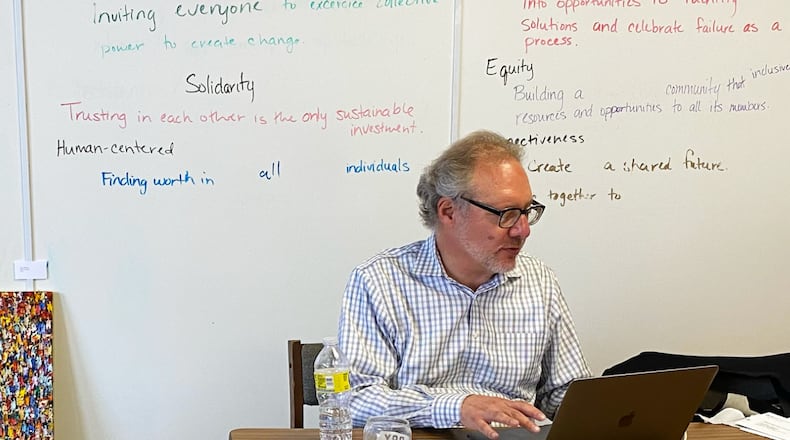Words such as “solidarity” and “sustainability” loom above Benkendorf in dry-erase as he types away on his Macbook. But those words are not empty labels one might typically find written in a boardroom setting: from The Collaboratory’s perspective, they’re achievable milestones.
Bill Evans, executive director of the House of Bread, walks in through The Collaboratory’s figurative revolving door. For half an hour, the two wishful changemakers talk about grocery co-ops, poverty lines, qualms with the systems in place and actions to fix them.
These are the spontaneous yet pivotal interactions that happen on any given day at The Collaboratory. Involvement spanning the gamut of board chairs and CEOs to non-partisan citizens make these more than just conversations: they’re propositions from within that can make a difference in local culture, with the potential for universal appeal.
Spreading a message by way of community illustrates the impact a voice can have and Peter Benkendorf has provided an effective platform for Daytonians for nearly two decades.
In the early 1990s in Chicago, before The Collaboratory in its current form, Benkendorf founded the non-profit organization Involvement Advocacy which derives its name from an Eastern proverb: “Tell me and I forget, teach me and I may remember, involve me and I learn.”
From that impetus came Voices of Cabrini, the only resident-run newspaper in Chicago public housing in its four years of publication. Co-founded by Benkendorf and Cabrini-Green resident Henrietta Thompson, Voices of Cabrini shed light onto the infamous neighborhood and demonstrated what a voice can do.
“It was really about how do we get people in the community more engaged in addressing the systemic issues that they’re facing,” Benkendorf said.
As a mechanical engineer with advertising and marketing experience, Benkendorf knows how to create brands and brand identities, which help develop ideas alongside his uncanny ability to perpetuate connections.
Since the early days of the Involvement Advocacy, the amount of initiatives has snowballed: somewhere around 50 launched, co-created or in-progress programs have come out of The Collaboratory. From Ethnosh, a food outing encouraging cross-cultural discovery through immigrant-owned restaurants, to Dayton Porchfest, the largest free music festival in the city, to bus station drum circles, The Collaboratory has listened to and collaborated with folks in diverse spheres of influence.
Scott Millsop, an AmeriCorps VISTA, has been working alongside Benkendorf since August 2023. His focus has been The Collaboratory’s partnership with Gallup and the Well-Being Initiative, which recently launched Healing Arts Dayton: a directory website of healing practices, like yoga and sacred dance, for Dayton and the surrounding counties. It’s currently populated but will be updated regularly.
“[Working with The Collaboratory has] allowed me to connect with serious people that also share certain ideas,” Millsop said. “It recharged my sense that you need to just do it.”
Another project that’s been outlined on whiteboards, and is on its way to becoming a reality, is urban agriculture: a practice that can eliminate food deserts, create food affordability and decrease hunger in metropolitan environments.
“We’ve got a serious working group, a consensus on direction and a likelihood of funding,” Millsop said. “We can actually make a significant cultural impact by doing this in Dayton that can be recreated [elsewhere].”
Recreating is the objective: so long as people are sustainably fed, the initiative is designed to exist outside of Dayton, too. This goes for most ideas siphoned through Benkendorf’s non-profit venture.
The Collaboratory resume is too full to list here. But if there’s anything that Peter Benkendorf has proven with the foundational principles of The Collaboratory, it’s that conversations can trigger change.
“Everything starts here with an idea,” Benkendorf said. “Whether it’s my idea or when somebody walks in the door.”
It’s a door that’s open most days of the week, one that has historically opened up to other doors.
More details
The Collaboratory is located in Talbott Tower at 114 West First St, Dayton. Walk-ins are welcome. For more information, visit daytoncollaboratory.org.
About the Author

